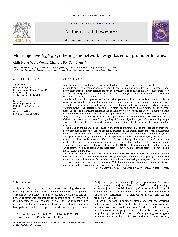摘要
Some current promoter libraries have been developed for synthetic gene networks. But an efficient method to engineer a synthetic gene network with some desired behaviors by selecting adequate promoters from these promoter libraries has not been presented. Thus developing a systematic method to efficiently employ promoter libraries to improve the engineering of synthetic gene networks with desired behaviors is appealing for synthetic biologists.
In this study, a synthetic gene network with intrinsic parameter fluctuations and environmental disturbances in vivo is modeled by a nonlinear stochastic system. In order to engineer a synthetic gene network with a desired behavior despite intrinsic parameter fluctuations and environmental disturbances in vivo, a multiobjective H-2/H-infinity reference tracking (H-2 optimal tracking and H-infinity noise filtering) design is introduced. The H-2 optimal tracking can make the tracking errors between the behaviors of a synthetic gene network and the desired behaviors as small as possible from the minimum mean square error point of view, and the H-infinity noise filtering can attenuate all possible noises, from the worst-case noise effect point of view, to achieve a desired noise filtering ability. If the multiobjective H-2/H-infinity reference tracking design is satisfied, the synthetic gene network can robustly and optimally track the desired behaviors, simultaneously.
First, based on the dynamic gene regulation, the existing promoter libraries are redefined by their promoter activities so that they can be efficiently selected in the design procedure. Then a systematic method is developed to select an adequate promoter set from the redefined promoter libraries to synthesize a gene network satisfying these two design objectives. But the multiobjective H-2/H-infinity reference tracking design problem needs to solve a difficult Hamilton-Jacobi Inequality (HJI)-constrained optimization problem. Therefore, the fuzzy approximation method is employed to simplify the Hit-constrained optimization problem to an equivalent linear matrix inequality (LMI)-constrained optimization problem, which can be easily solved by selecting an adequate promoter set from the redefined promoter libraries using the LMI toolbox in Matlab.
Based on the confirmation of in silico design examples, we can select an adequate promoter set from the redefined promoter libraries to achieve the multiobjective H-2/H-infinity reference tracking design. The proposed method can reduce the number of trial-and-error experiments in selecting an adequate promoter set for a synthetic gene network with desired behaviors. With the rapid increase of promoter libraries, this systematic method will accelerate progress of synthetic biology design.
